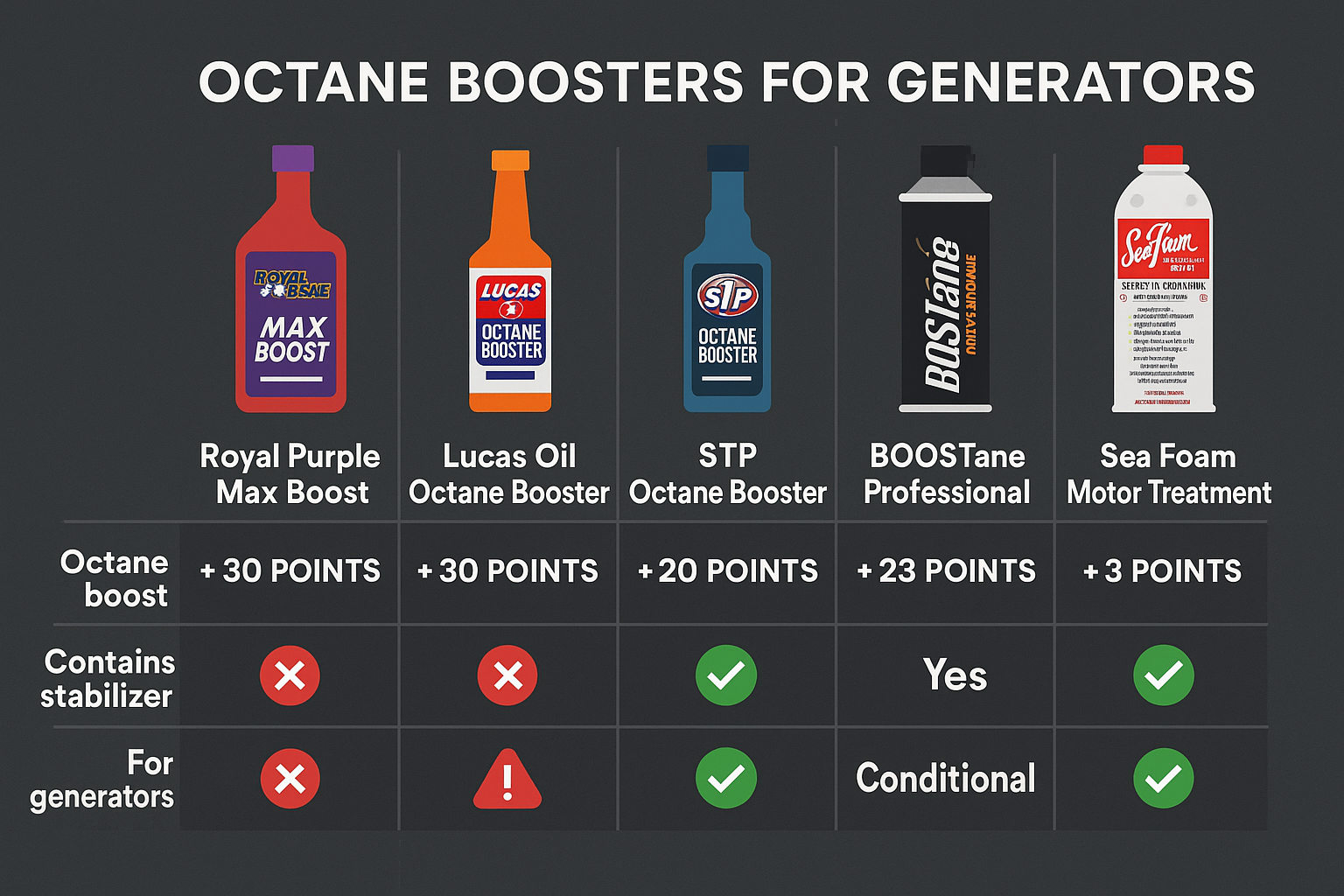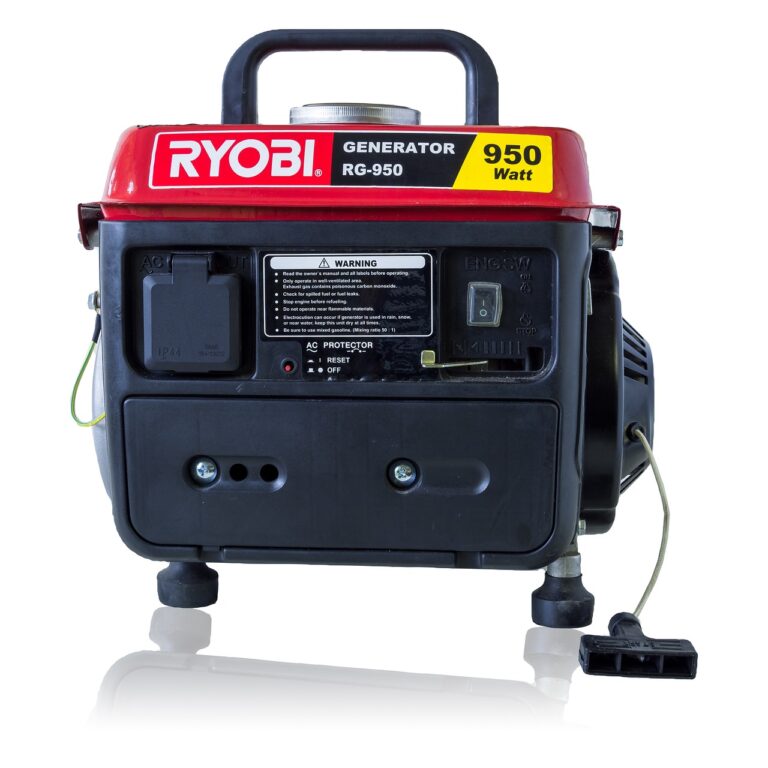Octane Boosters for Generators: Do They Actually Work?
In the world of generator maintenance and performance tuning, few products stir as much curiosity—and skepticism—as octane boosters. Marketed as fuel enhancers that increase engine power, efficiency, and lifespan, these additives promise a simple fix to common generator issues. But do they actually work? And more importantly, are they safe for your generator?
This comprehensive guide breaks down how octane boosters function, when (and if) you should use them, and the pros and cons you need to consider. We’ve also included comparison tables and expert tips for getting the most out of your generator.
Octane Booster Product Comparison Table
| Product Name | Octane Boost Range | Contains Stabilizer | Suitable for Generators | Key Ingredient(s) | Notable Feature | Approx. Price (USD) |
|---|---|---|---|---|---|---|
| Royal Purple Max Boost | Up to +30 points | ❌ No | ✅ Yes (high-performance) | MMT | Racing-grade formula, anti-knock agent | $15–20 (16 oz) |
| Lucas Oil Octane Booster | Up to +30 points | ❌ No | ✅ Yes (small engines) | MMT | Safe for turbo and carbureted engines | $8–12 (15 oz) |
| STP Octane Booster | ~+10 points | ❌ No | ✅ Yes (portable gensets) | MMT | Readily available, low-cost | $5–8 (5.25 oz) |
| BOOSTane Professional | Up to +116 points | ❌ No | ⚠️ Conditional (not all) | Proprietary blend | Designed for racing/tuned engines only | $30–35 (32 oz) |
| Sea Foam Motor Treatment | Minimal octane gain | ✅ Yes | ✅ Yes (storage aid) | Petroleum distillates | Cleans injectors, stabilizes fuel | $8–10 (16 oz) |
| Sta-Bil 360 Performance | Minimal octane gain | ✅ Yes | ✅ Yes (long-term storage) | Ethanol treatment | Great for ethanol-blended fuels | $10–12 (10 oz) |
What Is an Octane Booster?
An octane booster is a fuel additive designed to raise the octane rating of gasoline. Octane rating measures a fuel’s resistance to knocking or pre-detonation during combustion.
Pre-detonation can damage engine components, reduce performance, and increase emissions—especially in high-compression engines like some inverter generators.
How It Works:
- Octane boosters alter the fuel’s chemical composition, improving its resistance to premature ignition.
- Most contain ingredients like methylcyclopentadienyl manganese tricarbonyl (MMT), ethanol substitutes, or aromatic hydrocarbons.
Should You Use Octane Boosters in Generators?
Generators—especially newer inverter models—are engineered to run on standard unleaded gasoline (87–89 octane). Using higher-octane fuel or additives doesn’t always guarantee better performance.
However, octane boosters may help in certain scenarios, such as:
| Situation | Is Octane Booster Helpful? | Notes |
|---|---|---|
| Low-quality or old gasoline | Yes | Improves stability and combustion efficiency |
| High-altitude operation | Yes | Helps compensate for reduced oxygen density |
| High-performance or tuned engines | Yes | Needed for modified or non-standard generators |
| Standard 87-octane fuel in good condition | Not needed | No performance benefit; may waste money |
| Propane or natural gas-powered units | Not applicable | Octane boosters are for gasoline only |
Pros of Using Octane Boosters in Generators
| Benefit | Description |
|---|---|
| Reduces Knocking and Engine Ping | Prevents pre-detonation under load or heat |
| Extends Engine Life | Smoother combustion reduces stress on pistons and valves |
| Enhances Fuel Stability | Some boosters include stabilizers to improve gasoline shelf life |
| Useful in Emergency Storage | Helps revive old or degraded fuel during disaster preparedness |
| May Improve Performance Marginally | In tuned or high-demand generators, can result in smoother power delivery |
Cons and Limitations
| Drawback | Description |
|---|---|
| Minimal Impact on Standard Units | No major gains if your generator is tuned for 87-octane |
| Can Be Expensive | Premium octane boosters add up over time |
| Overuse Risks Carbon Buildup | Especially with manganese-based additives like MMT |
| Not Compatible with All Engines | Always check your owner’s manual for additive safety |
| Doesn’t Replace Maintenance | It won’t fix clogged filters or dirty carburetors |
Popular Octane Booster Ingredients (and What They Do)
| Ingredient | Purpose | Pros | Cons |
|---|---|---|---|
| MMT (Manganese) | Increases octane level | Effective in small doses | Can foul spark plugs if overused |
| Toluene/Xylene | Raises knock resistance | Common in racing applications | Harsh on rubber/fuel lines |
| Iso-octane | Standard fuel component | Stable and effective | Expensive in pure form |
| Alcohols (Ethanol/MTBE) | Boosts combustion efficiency | Burns clean | Can absorb moisture |
| Fuel Stabilizers | Extends gasoline life | Ideal for storage use | No octane effect alone |
When to Consider Using an Octane Booster
| Use Case | Recommended? | Why? |
|---|---|---|
| Using old/stored gasoline | Yes | Revives degraded fuel, reduces knocking |
| Running at high altitudes | Yes | Helps compensate for thinner air |
| Using premium portable generators | Conditional | Only if engine requires >89 octane or under heavy load |
| Routine use with fresh fuel | No | Not cost-effective or necessary |
| Attempting to clean engine | No | Use carb cleaners or fuel system cleaners instead |
Expert Tips for Safe Use
- Use Only As Directed: Never exceed recommended dosage. More isn’t better—it can cause harm.
- Check Your Generator Manual: Some manufacturers void warranties if fuel additives are used.
- Pair with Fuel Stabilizer: For long-term storage, use a combined octane booster + stabilizer blend.
- Label Your Fuel Containers: Avoid mixing treated and untreated gas if not using consistently.
- Watch for Carbon Buildup: Inspect spark plugs regularly if you use boosters frequently.
Does It Actually Work?
Yes—but with important caveats.
- If you’re using old or low-quality gas, octane boosters can improve combustion stability and reduce knocking.
- On standard generators running fresh 87-octane fuel, you’ll see little to no difference in performance.
- For modified, high-performance, or high-altitude applications, octane boosters can be beneficial.
Are Octane Boosters Worth It?
Octane boosters do work—but only when used correctly and in the right situations. For everyday use on stock generators with fresh fuel, they’re not essential. But if you rely on stored fuel, live in high altitudes, or operate a high-demand generator, they can be a smart addition to your maintenance toolkit.
💡 Final Tip: Keep a small bottle of octane booster in your emergency generator kit, especially if you store gasoline for more than 2–3 months.



